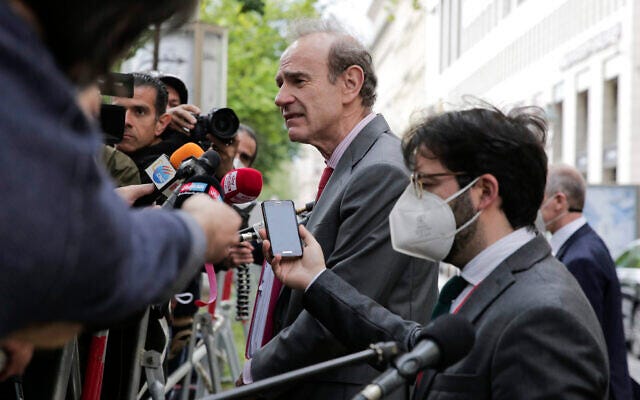Iran deal may be moving ‘within reach,’ negotiators break til next week
‘Now beginning to see the contours of what the final deal could look like,’ European diplomats

“I will not venture a date…but I am quite sure that there will be a final agreement,” EU political director Enrique Mora
“We have made substantial progress over the last ten days. But there are still things to be worked out, and we will reconvene next week and we will continue working,” Mora.
“We have made tangible progress…Both on the nuclear side and the sanctions side, we are now beginning to see the contours of what the final deal could look like,” E3 diplomats. “However, success is not guaranteed.”
The European Union political director said today that “substantial progress” had been made in the past ten days of international talks in Vienna on restoring US and Iranian full compliance with the 2015 Iran nuclear deal, and expressed confidence that a final deal would be reached.
“We have made substantial progress over the last ten days,” European Union political director Enrique Mora told journalists after the fourth round of international talks in Vienna today. “But there are still things to be worked out, and we will reconvene next week and we will continue working.”
“I will not venture a date, because you never know, but I am quite sure that there will be a final agreement,” Mora said.
Mora said he understood that the Iranians are negotiating a possible extension of a technical agreement with the International Atomic Energy Agency that was due to expire on May 21. Iranian media suggested that a deal extension could be announced out of Iran early next week.
“I know this is something the Iranians are now negotiating with the agency and my understanding is they will continue negotiating to renew the technical agreement,” Mora said, talking to journalists on the noisy street outside Vienna’s Grand Hotel, where the Joint Commission, comprised of the EU, UK, France, Germany, Russia, China and Iran, met today (May 19).
The U.S. delegation, led by Special Envoy Rob Malley, was due to return to Washington tomorrow (May 20), and did not yet offer substantive remarks on how it assessed progress in the talks in the latest round.
“I don’t have any specifics to read out, but I will say that broadly speaking our Special Envoy Robert Malley will be back in Washington for consultations by the end of this week…and the delegation will actually be set to return to Vienna for a fifth round of talks [early] next week,” State Department deputy spokesperson Jalina Porter told journalists in a phone briefing today.
After the previous three rounds of talks underway since April, American officials have generally been more cautious than some of the other parties in their assessment of how much progress has been made. They have raised the question if the Iranian leadership has made the political decisions needed for Iranian negotiators to conclude a deal on the US and Iran returning to full compliance with the pact, formally known as the Joint Comprehensive Plan of Action (JCPOA).
“This is ultimately a matter of a political decision that needs to be made in Iran,” a senior State Department official said May 6.
Iran is due to hold presidential elections on June 18, in which relatively moderate two-term President Hassan Rouhani cannot run again. Some Iran observers believe that Iran’s Supreme Leader Ayatollah Ali Khamenei might want to avoid a deal return announcement before Iran’s elections that it is thought could boost turnout in favor of more moderate candidates.
The three European parties (E3) to the Iran nuclear deal, the UK, France, and Germany, whose views on the Iran negotiations have generally tended to align with those of the Biden administration, also suggested today that more substantive progress had been made in the last round.
“We have made tangible progress,” E3 diplomats said, according to the Wall Street Journal’s Laurence Norman. “Both on the nuclear side and the sanctions side, we are now beginning to see the contours of what the final deal could look like.”
“However, success is not guaranteed,” they added. “There are still some very difficult issues ahead. We do not underestimate the challenges that lay before us.”
“My sense is that they have made progress on some of the less controversial issues, and I imagine that they now have…a joint draft, with a lot of brackets in it,” Ali Vaez, director of the Iran program at the International Crisis Group, told me. “Now is the time to get more instructions from the capitals to see if they can bridge gap on the core issues.”
He identified some of the core remaining issues as mostly relating to US non-nuclear sanctions, and to the irreversible progress Iran has made, particularly on its centrifuge research and development, noting it was anticipated that those would be “the more difficult nuts to crack.”
“I still think it is possible to wrap up these negotiations, with a complete roadmap for re-entering JCPOA, by mid-June,” Vaez said.
Russia’s lead negotiator at the talks also expressed optimism that a deal on restoring the JCPOA was moving within reach.
Participants at the Joint Commission today “noted that ‘good’ or ‘significant’ progress was made and that an agreement is ‘within reach,’” Russian ambassador to the IAEA Mikhail Ulyanov tweeted today. “The Joint Commission will resume its work early next week. Hopefully the 5th round will be final.”


